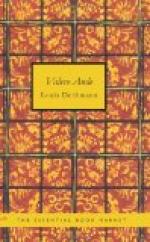If, by attention and care, the treatment has succeeded in strengthening the energy of the resisting organism to a certain degree during the fever, it becomes necessary in due course to regulate the desire for food, which sometimes grows and asserts itself in a rapid and energetic manner, while the fever is receding.
The cessation of fever by no means indicates that the ulcers are completely healed, and any mistake as to quantity and quality of food may cause a relapse. Liquid diet must, therefore, be given exclusively for at least, another eight days after the fever has ceased. After this, from week to week, gradually, the use of Form III, may be employed and thereafter more solid food, as given anon, under Form IV.
These cautions must be strictly heeded, especially in case of typhus recurrens.
If in the course of typhus severe complications, such as hemorrhage of the intestines or perforation thereof, should supervene, nourishment must immediately be reduced to a minimum. In such instances it is best to confine the diet to mucilaginous soup and to forbid everything else, as long as hemorrhages have not ceased, or the other dangerous peritonitic symptoms have not disappeared. Gradually, Form V and lastly, Form VI, may be followed.
Form IV. Diet of the lightest kind, containing meat, but only in scraped or shredded form. Noodle soup, rice soup.
Mashed boiled brains or sweetbread,
or puree of white or red
roasted meat, in soup.
Brains and sweetbread boiled.
Raw scraped meat (beef, ham, etc.)
Lean veal sausages, boiled.
Mashed potatoes prepared with milk.
Rice with bouillon or with milk.
Toasted rolls and toast.
Form V. Light diet, containing meat in more solid form.
Pigeon, chicken boiled.
Small fish, with little oil, such as brook or lake trout, boiled.
Scraped beefsteak, raw ham, boiled tongue.
As delicacies: small
quantities of caviar, frogs’ legs, oysters,
sardelle softened in milk.
Potatoes mashed and salted,
spinach, young peas mashed, cauliflower,
asparagues tips, mashed chestnuts,
mashed turnips, fruit sauces.
Groat or sago puddings.
Rolls, white bread.
Form VI. Somewhat heavier meat diet. (Gradually returning to ordinary food.)
Pigeon, chicken, young deer-meat, hare, everything roasted.
Beef tenderloin, tender roast beef, roast veal.
Boiled pike or carp.
Young turnips.
All dishes to be prepared with very little fat, butter to be used exclusively. All strong spices to be avoided. Regarding drinks to be taken with these forms of diet, as a rule good drinking water takes the first place. This is allowed under all circumstances. Still less irritating are weak decoctions of cereals, such as barley and rice water. Other light nutritive non-irritating drinks are bread water and albumen water.




